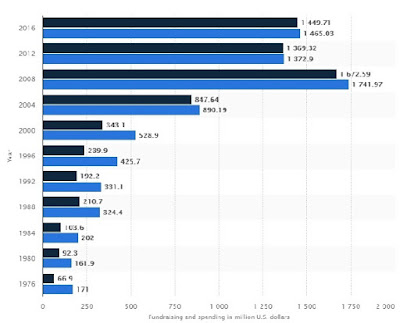Ponder running for public office. You want to serve your country and perhaps
ultimately become a member of congress or a senator. How would you start the process? One path is to run for a local office, a
county or city commissioner perhaps, and then slowly work your way up to more
senior positions. But even at the lowest
levels of elected office it is necessary to raise money or spend your own. One needs flyers and posters. There are meetings to host.
At higher levels the amount of money necessary to run for
office is staggering. Even a modest run
at a congressional seat requires over a million dollars on average. For the senate, it is a whopping ten
million! Unsurprisingly, the necessary
amount has risen dramatically since the supreme court case of Citizens United
versus the Federal Election Commission that basically allowed unlimited
spending by corporations to influence elections. The total for presidential elections now
exceeds a billion dollars each election cycle.
Here is the growth in presidential election spending from 1976 to 2016
(blue is money raised and black is money spent)
When you add congressional election spending the total
explodes to over $6B in the 2016 election cycle! And the 2018 election spending was $5.7B just
for congress. Compare this to 2000 - $3B
– and you can see the rapid growth. In this spreadsheet the column on the left is the total, the next column is the congressional spending and the third column is the presidential spending.
Running for office is a money game rather than a process of
finding good citizens to represent the people.
A friend of mine recently ran for congress. He spent most of his time fundraising and
contributed quite a bit of his own money.
The only reason he was able to compete at all was due to a large network
of relatively wealthy friends. There are
rare exceptions to this rule, the recent election of AOC being a good example,
but generally, election to higher office is limited to people with lots of
money and connections.
How does our election process and campaign spending compare
with other developed countries? The costs
for elections in France, Germany and the UK are a tiny fraction of those of the
U.S. Most other developed nations limit
their election process to a few weeks or months before elections, whereas the
U.S. is in almost a continuous election process.
In other countries many of the election costs
are publicly financed and parties are limited to a few spots on television and
radio. Candidates spend very little time
running for office except for the weeks before the election. They almost never do personal fundraising –
the emphasis is on the party and its platform rather than individual candidates.
And the irony is that the percentage of eligible voters who
vote in the U.S. is close to the bottom of the developed nations – about 58% in
the last presidential election and much less in non-presidential years. Of course, that may be due to the obstacles
placed in front of potential voters – the registration process, the fact that
elections occur on workdays, etc.
What does all this money do to our political ecosystem? If a candidate relies on powerful and wealthy
individuals or interest groups to fund his or her campaign, then clearly there
is an expectation of quid pro quo from these groups. Donors may say otherwise – that they are
supporting a candidate because they believe in the person and their political
beliefs – but if a candidate needs large amounts of money to stay in office
then it is illogical and naïve to believe that he or she will not act in a way
that ensures the continuing flow of those funds. Money buys influence.
The growth in spending in our elections seems likely to be
intimately related to the rancor in our politics. With so much money being spent, the stakes
grow ever higher for political actors and they stake out more extreme positions
with less room for compromise or negotiation.
Donors and PACs are not giving huge sums because they have moderate
political aims. On the contrary, the more
radical the agenda, the more generous the spending. The radical nature of the giving and expectations
is amplified dramatically through social media.
The actual election spending is dwarfed by the money spent to sway
voters through facebook, youtube and their more unsavory cousins on the
fringes.
Our political health would benefit from a massive overhaul
of our election process. Here are some
suggestions:
- Limit the timeframe for the campaign process. Primaries should be 1 month, and the final election process should be 3 months for the President, 2 months for congress.
- Spending for each party should be limited based on the election. Platform descriptions and campaign ads should be reviewed by a bi-partisan panel for ‘reasonable’ accuracy.
- A single website for detailed information about the candidates and parties should be maintained by an election commission as a way for every citizen to fully access accurate and less partisan data.
- Elections should be held on Sundays and early on-line voting should be made easily accessible for all voters.
If we do nothing to address the growing chaos and waste of
our political process, then we face a very frightening future of instability
and civil discord.

